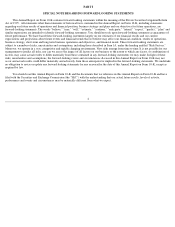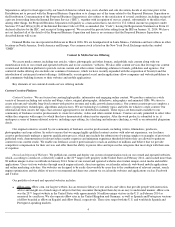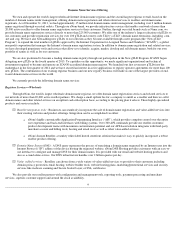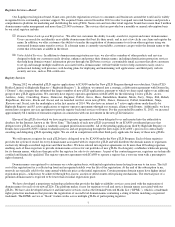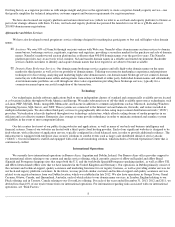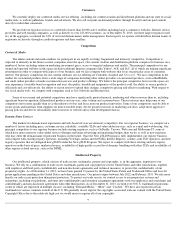Enom 2013 Annual Report Download - page 14
Download and view the complete annual report
Please find page 14 of the 2013 Enom annual report below. You can navigate through the pages in the report by either clicking on the pages listed below, or by using the keyword search tool below to find specific information within the annual report.
Furthermore, our advertising agreements with Google may not continue to generate levels of revenue commensurate with the revenue we
received from them during past periods. Our ability to generate online advertising revenue from Google depends on its assessment of the quality
and performance characteristics of Internet traffic resulting from online advertisements placed on our owned and operated we bsites and on our
network of customer websites, as well as other factors determined solely by Google. Google may also change its existing, or establish new,
methodologies and metrics for valuing the quality of Internet traffic and delivering cost-per-click advertisements. Any changes in these
methodologies, metrics and advertising technology platforms could decrease the advertising rates that we receive and/or the amount of revenue
that we generate from online advertisements. Since most of our agreements with Google contain exclusivity provisions, we are prevented from
using other providers of services similar to those provided by Google. In addition, Google may at any time change the nature of, or suspend, the
service that it provides to online advertisers and the catalog of advertisers from which online advertisements are sourced. These types of changes
or suspensions would adversely impact our ability to generate revenue from cost-per-click advertising. Any change in the type of services that
Google provides to us could have a material adverse effect on our business, financial condition and results of operations.
Our content and media service offering generates its revenue primarily from advertising. A reduction in online advertising spend, a loss of
advertisers or lower advertising yields could seriously harm our business, financial condition and results of operations.
We rely on third-party advertising providers, such as Google, to provide advertisements on our owned and operated websites and on our
network of customer websites. For the years ended December 31, 2013 and 2012, we generated 50% and 53%, respectively, of our revenue from
advertising. One component of our platform that we use to generate advertiser interest is our system of monetization tools, which is designed to
match content with advertisements in a manner that optimizes revenue yield and end-user experience. Advertisers will stop placing
advertisements on our owned and operated websites or our customer websites if their investments do not generate sales leads, and ultimately
customers, or if we do not deliver their advertisements in an appropriate and effective manner. The failure of our yield-optimized monetization
technology to effectively match advertisements with our content in a manner that results in increased revenue for our advertisers would have an
adverse impact on our ability to maintain or increase our revenue from advertising. Even if our content is effectively matched with
advertisements, our current advertisers may not fulfill their obligations under their existing contracts with us and they may not continue to place
advertisements on our websites beyond the terms of their existing contracts. If any of our advertisers, and in particular Google, decided not to
continue advertising on our owned and operated websites or on our customer websites, we could experience a rapid decline in our revenue over a
relatively short period of time.
We have also recently shifted our advertising strategy to focus on programmatic offerings that utilize advertising network exchanges
rather than a direct sales force. This shift requires us to actively manage the sale of our owned and operated inventory on an advertising
exchange . An inability to successfully implement and manage this process could have a material adverse effect on our business, financial
condition and results of operations. Additionally, brands and advertisers are increasingly focusing a portion of their online advertising budgets
on social media outlets such as Facebook and Twitter. If this trend continues and we are unable to offer competitive or similarly valued
advertising opportunities, our revenue from advertising could be adversely impacted.
We also believe that advertising spending on the Internet, as in traditional media, fluctuates significantly as a result of a variety of factors,
many of which are outside of our control. These factors include variations in expenditures by advertisers due to budgetary constraints; the
cyclical and discretionary nature of advertising spending; general economic conditions, as well as economic conditions specific to the Internet
and media industry; and the occurrence of extraordinary events, such as natural di sasters, international or domestic terrorist attacks or armed
conflict. An inability to maintain or increase our advertising revenue could have a material adverse effect on our business, financial condition
and results of operations.
If we are unable to attract and retain visitors to our owned and operated websites and to our customer websites, or if we are required to
accelerate amortization expense in connection with content remediations, our business, financial condition and results of operations would
be adversely affected.
Our success in attracting traffic to our owned and operated websites and to our customer websites and converting these visitors into repeat
users depends, in part, upon our continued ability to identify, create and distribute high-
quality, engaging and commercially valuable content and
connect consumers with the formats and types of content that meets their specific interests and enables them to interact with supporting
communities. We may not be able to identify and create the desire d variety and types of content in a cost-effective manner or meet rapidly
changing consumer demand in a timely manner, if at all. Additionally, while each of our freelance creative professionals is screened through our
pre-qualification process, we cannot guarantee that the content created by them will be of sufficient quality to attract users to our owned and
operated websites or to our customer websites. Any failure to identify, create and distribute high-quality, commercially valuable content could
negatively impact user experiences and reduce traffic driven to our owned and operated websites and to our customer websites, which would
adversely affect our business, financial condition and results of operations.
We regularly evaluate and strive to continuously improve our websites, content library and content creation and distribution platform in an
effort to improve user experience and engagement. Such improvements include refining our content library through
12


